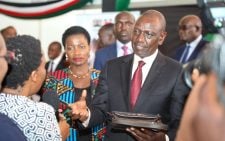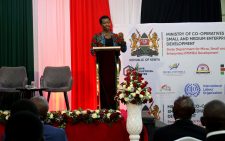How Kenya is backing MSMEs, its economic backbone

The United Nations designated June 27 as Micro-, Small, and Medium-sized Enterprises Day through resolution A/RES/71/279 in 2017, recognising MSMEs as economic backbones worldwide. This year’s theme – “Enhancing the role of MSMEs as drivers of sustainable Growth and innovation” – emphasises their critical role in advancing sustainable practices amid global challenges including political tensions, digital transformation, and climate crises.
The celebration comes as Kenya recovers from recent nationwide demonstrations that caused significant enterprise destruction and looting, highlighting MSMEs’ vulnerability yet essential role in achieving Sustainable Development Goals.
Kenya has undertaken transformative reforms, establishing a dedicated State Department for MSMEs through Executive Order No. 1 of 2023, the first in history. This institutional framework coordinates the sector and connects MSMEs to opportunities, supported by constitutional provisions promoting devolution and economic rights.
Kenya’s MSME sector contributes over 40 percent of GDP and serves as a key employment source, especially for women, youth, and vulnerable groups. However, they struggle with limited loan access, poor infrastructure, and challenging operating conditions, with many operating informally.
Annually, one million youth enter the job market while only 200,000 secure formal employment. Of Kenya’s 20 million workforce, merely 3.5 million are formally employed, highlighting MSMEs’ crucial bridging role. Globally, over 600 million jobs will be needed by 2030, making MSME development a government priority.
The government is developing the MSME Policy 2025, strengthening institutional frameworks, streamlining processes, and enhancing access to finance, markets, and technology. The policy addresses climate resilience, digital readiness, and formalization, aligning with Vision 2030’s Fourth Medium-Term Plan.
The national government mobilises resources through the Financial Inclusion Fund, facilitating “credit repair” for entrepreneurs previously excluded from financial institutions. Over 20,000 government services are available on the eCitizen platform, allowing entrepreneurs to register businesses and access credit from basic mobile phones.
The Access to Government Procurement Opportunities (AGPO) programme reserves 30 percent of public procurement for youth, women, and persons with disabilities, with efforts to mainstream this into the private sector.
Kenya will host the East African Trade Fair, providing platforms for promoting diversified brands and improving regional business within the East African Community. The 2024 National MSMEs Survey, the first since 2016, examines enterprise activities, geographic distribution, and skill levels to quantify sectoral contributions.
The ministry launched MSMEs Connect, a flagship initiative enhancing visibility and policy dialogue across all 47 counties. This programme offers platforms to engage stakeholders, access resources, and showcase innovations, creating a globally competitive ecosystem.
In February 2025, African Union Heads of State adopted a 10-year Social and Solidarity Economy strategy, aligning with the 2023 UN Resolution recognizing MSMEs’ role in sustainable development. Kenya demonstrates commitment through programs like the Uwezo Fund and Hustler Fund, empowering marginalized groups with financial support.
As the world marks International MSMEs Day, Kenya celebrates a sector driving inclusive growth, innovation, and resilience.
The writer is a Public Communications Officer at the State Department for MSMEs.















